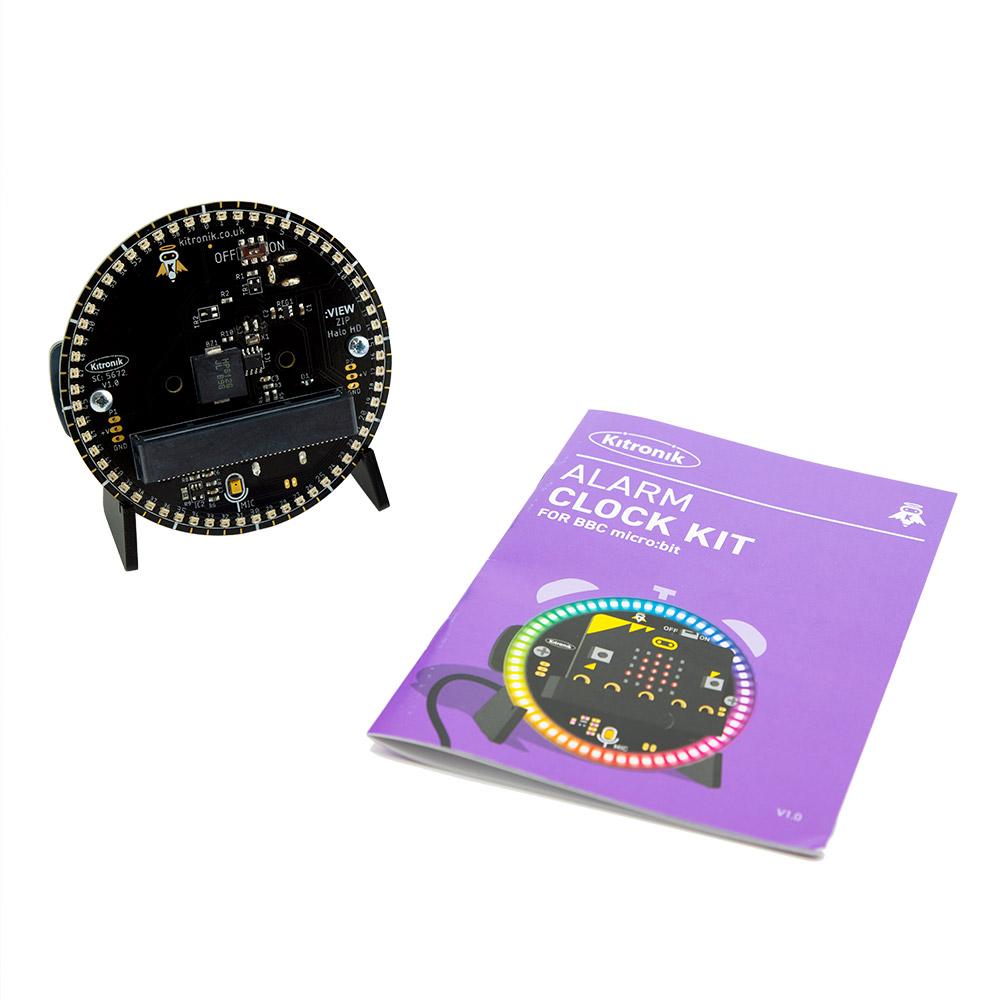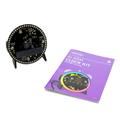Kitronik Alarm Clock Kit with ZIP Halo HD for micro:bit

Description
The Kitronik Alarm Clock Kit with ZIP Halo HD for microbit provides a fun introduction to features of Halo HD. This kit features a modified version of Halo HD, all of the parts required to build the clock, and also power accessories. To get you started we have included an easy to follow tutorial book which will guide you through building your clock & checking all the LEDs are working correctly with some test code. Once this is done, we can then move online for some further tutorials within MakeCode.
The Kitronik Alarm Clock Kit with ZIP Halo HD for micro:bit features a modified version of Halo HD. This modified version is only available via this kit. The changes are as follows; power is now provided via a 2.1mm barrel jack connection and there is also a coin cell holder fitted to the rear of the board. When a 1220 coin cell battery is inserted, it will then provide power to the RTC chip when no power is being supplied to Halo HD. This ensures that you only have to set up the time for your project once. The maths would suggest that the coin cell can last for up to 2 years in this application, though real-world experiences may vary.
The Kitronik Halo HD board for the BBC micro:bit incorporates 60 individually addressable full-colour ZIP LEDs. It also breaks out P1 and P2 to a standard 0.1” footprint, it features a MEMS microphone for detection of sound, and a piezo buzzer to play sound. If that weren't enough, it also features an onboard real-time clock (RTC) controlled by I2C lines from the microbit. The board also has M3 mounting holes for a more sturdy project. We think you'll agree, the board is loaded with useful features. It doesn't stop there...
Note:
Kitronik Alarm Clock Kit Features:
ZIP Halo HD for microbit Features:
Contents:
Dimensions:
Resources:
The Kitronik Alarm Clock Kit with ZIP Halo HD for micro:bit features a modified version of Halo HD. This modified version is only available via this kit. The changes are as follows; power is now provided via a 2.1mm barrel jack connection and there is also a coin cell holder fitted to the rear of the board. When a 1220 coin cell battery is inserted, it will then provide power to the RTC chip when no power is being supplied to Halo HD. This ensures that you only have to set up the time for your project once. The maths would suggest that the coin cell can last for up to 2 years in this application, though real-world experiences may vary.
The Kitronik Halo HD board for the BBC micro:bit incorporates 60 individually addressable full-colour ZIP LEDs. It also breaks out P1 and P2 to a standard 0.1” footprint, it features a MEMS microphone for detection of sound, and a piezo buzzer to play sound. If that weren't enough, it also features an onboard real-time clock (RTC) controlled by I2C lines from the microbit. The board also has M3 mounting holes for a more sturdy project. We think you'll agree, the board is loaded with useful features. It doesn't stop there...
Note:
- No soldering is required.
- Some quick and simple mechanical assembly is required for the stand.
- Ensure that when using a power supply that it is rated for at least 1A and 5V, many modern phone chargers will be suitable for this application.
- Full instructions for assembly, coding and also usage are detailed in the supplied booklet.
Kitronik Alarm Clock Kit Features:
- The Kitronik Alarm Clock Kit with ZIP Halo HD for microbit provides a great introduction to features of Halo HD.
- Learn how to create and then to code exciting projects that explore time, light and sound.
- The kit is backed up by a range of fun tutorials that introduce you to the exciting features of the Alarm Clock Kit.
- All of the tutorials and subsequent resources are free and with no signups needed.
- There is no soldering required and the mechanical assembly is quick and also super simple.
- The board features CR1220 3V coin cell battery holder that acts as a clock battery backup for the RTC chip when a battery is inserted.
- The maths suggests that the backup battery can last for up to 2 years. Experiences may vary from battery to battery and also situation to situation.
ZIP Halo HD for microbit Features:
- The board features 60 individually addressable full-colour ZIP LEDs.
- P1 and P2 are broken out to a standard 0.1” footprint.
- It's wired for sound with a MEMS microphone and a piezo buzzer.
- It has an onboard Real-time clock (RTC) controlled by I2C lines.
- The onboard microbit edge connector provides a plug and play environment!.
- The On/off switch helps you maximise battery life, CR1220 3V coin cell will then protect the RTCs memory.
- Code it with MakeCode using Kitronik custom blocks inside the MakeCode editor.
- It can also be coded with MicroPython. A link to an example can be found in the list of resources.
- M3 Mounting holes, for more secure projects.
Contents:
- 1 x Kitronik Halo HD for BBC micro:bit.
- 4 x 8mm M3 machine screws.
- 1 x Set of laser cut Perspex stand parts.
- 1 x CR1220 3V coin cell battery.
- 2 x Plastic spacers.
- 1 x 3AA Battery holder also fitted with a DC Jack.
- A USB-B to 2.1mm jack cable, rated for 5V, 1.5A.
- Getting started booklet.
- A plastic reusable shipping and storage container.
Dimensions:
- ZIP Halo HD Diameter: 87mm.
- M3 Mounting Holes Spacing (Center to Center): 68.4mm.
Resources:
Properties
Brand information
| Brand | Kitronik |
| Model | 5681 |
€ 33,60€ 27,80 Excl. VAT (NL)
Alternatives in stock
Alternative products
- Kitronik ZIP Halo for the BBC micro:bit € 13,90 View product
- Kitronik ZIP Tile for BBC microbit € 23,80 View product
- Kitronik ZIP Halo HD for the BBC micro:bit € 29,90 View product
- Kitronik Klip Halo V2.0 with JST € 10,35 View product
- Kitronik Klip Halo V2.0 with 2x AA Battery Holder € 14,70 View product
- Kitronik ZIP Arc - 12 ZIP LEDs € 7,50 View product
- 5 pieces In stock Kitronik ZIP Hex LED, pack of 5 € 7,50 View product
- Kitronik ZIP Arc - 15 ZIP LEDs € 2,60 View product
- In stock ZIP LEDs Add-On Pack for Kitronik Inventors Kit for micro:bit € 18,20 View product
- Kitronik ZIP Circle - 12 ZIP LEDs € 7,20 View product
- Kitronik :GAME ZIP 64 for the BBC micro:bit € 35,- View product
- Kitronik :GAME ZIP 64 for the BBC micro:bit Classroom Pack € 448,95 View product
Related products
Customer questions
Q
Customer Reviews
Kitronik Alarm Clock Kit with ZIP Halo HD for micro:bit ★★★★★Click a star to leave your review
- In stock Kitronik Quartz Clock Mechanism € 4,25 View product
- In stock Kitronik 1xAA battery Cage with Leads € 1,20 View product
- In stock Kitronik Sewable Miniature Coin Cell Holder - CR2032 € 2,- View product
- In stock Kitronik Supercapacitor, 1F - 5.5V - 1 piece € 2,15 View product
- In stock Kitronik Electro-Fashion, Switched Coin Cell Holder - CR2032 € 2,90 View product
- In stock Kitronik Electro-Fashion, Light Sensing Coin Cell Holder € 4,70 View product
- In stock Kitronik :MOVE Motor Klaw Kit € 11,30 View product
- In stock Kitronik MI:power board for the BBC Microbit V2 € 7,- View product
- In stock Kitronik Round USB RGB LED Lamp € 8,25 View product
- In stock Kitronik 5V LED Desk Lamp Kit € 4,40 View product
- In stock ZIP LEDs Add-On Pack for Kitronik Inventors Kit for micro:bit € 18,20 View product
- In stock Kitronik 2xAAA Battery Cage with JST Connector € 1,70 View product
- In stock Noise Pack for Kitronik Inventor's Kit for the BBC micro:bit € 17,- View product
- In stock Kitronik 16GB Memory Stick, Uncased € 8,80 View product
- In stock Kitronik Micro USB to 5V breakout € 2,05 View product










